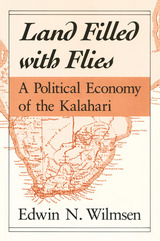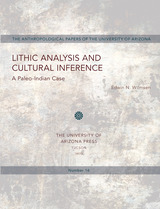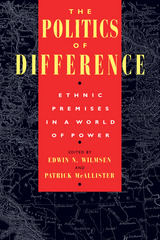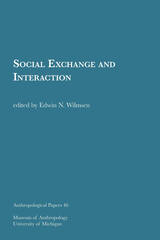5 books about Wilmsen, Edwin N.

Journeys with Flies
Edwin N. Wilmsen
University of Chicago Press, 1999
From 1973 to 1994, anthropologist Edwin Wilmsen lived and worked among the Zhu, Mbanduru, and Tswana people of the Kalahari desert in southern Africa. Thousands of miles from his home, immersed in what first seemed a radically different place, and operating in languages he initially did not understand, he began a record of his impressions and reflections as a complement to his scientific fieldwork. Journeys with Flies weaves together the multilayered experiences of his life among these Kalahari people, capturing at once the intellectual challenges an anthropologist faces in the field and the myriad and strange ways that unfamiliar experiences come to resonate with deeply personal thoughts and recollections.
Combining biography, poetry, and anthropology, Wilmsen vividly portrays the intense realities of life in the Kalahari and carries the reader across space and time as events in the present trigger emotions and memories. Images of apartheid, for example, evoke memories of Wilmsen's childhood in the segregated South. Poems, journal entries, and moving accounts of deepening personal relationships all intertwine as Wilmsen conveys the experiences he shares with his "subjects" in spite of vast differences in their backgrounds—extreme thirst under the desert sun, grief over the death of a child, and the constant irritation of ubiquitous flies.
"Our understanding of other peoples," he writes, "lies not in themselves or in anything that they do but in our experience of them. Experience that is lived partly in their world and partly in a shell of our world that we wear when we meet them."
Sophisticated, lyrical, and passionately written, Journeys with Flies will inspire all those who travel to places far from home.
Combining biography, poetry, and anthropology, Wilmsen vividly portrays the intense realities of life in the Kalahari and carries the reader across space and time as events in the present trigger emotions and memories. Images of apartheid, for example, evoke memories of Wilmsen's childhood in the segregated South. Poems, journal entries, and moving accounts of deepening personal relationships all intertwine as Wilmsen conveys the experiences he shares with his "subjects" in spite of vast differences in their backgrounds—extreme thirst under the desert sun, grief over the death of a child, and the constant irritation of ubiquitous flies.
"Our understanding of other peoples," he writes, "lies not in themselves or in anything that they do but in our experience of them. Experience that is lived partly in their world and partly in a shell of our world that we wear when we meet them."
Sophisticated, lyrical, and passionately written, Journeys with Flies will inspire all those who travel to places far from home.
[more]

Land Filled with Flies
A Political Economy of the Kalahari
Edwin N. Wilmsen
University of Chicago Press, 1989
"The image of a pristine isolation has been almost as common in research on foragers as in the popular media. Land filled with Flies is a sustanined argument against such views. Wilmsen marshals an enormous quantity of historical, archival, archeological, ethnographic, and survey data on the Kalahari Zhu to show how far from the reality these images are, how they have their own historical provenance, how they have been analytically distorting, and how they have proven politically pernicious for living groups like the Zhu."—Pauline Peters, Science
"[A] major work. . . . Anthropologists will, and should, use Wilmsen's meticulously detailed study to revise their early lectures in the introductory course, and no future study of African 'foragers' should ignore it."—Parker Shipton, American Anthropologist
"An impressive book. . . . The reader need only read the first few pages to judge both the quality and ambitiousness of the work. . . . Essential reading."—David R. Penna, Africa Today
"[A] major work. . . . Anthropologists will, and should, use Wilmsen's meticulously detailed study to revise their early lectures in the introductory course, and no future study of African 'foragers' should ignore it."—Parker Shipton, American Anthropologist
"An impressive book. . . . The reader need only read the first few pages to judge both the quality and ambitiousness of the work. . . . Essential reading."—David R. Penna, Africa Today
[more]

Lithic Analysis and Cultural Inference
A Paleo-Indian Case
Edwin N. Wilmsen
University of Arizona Press, 1970
The Anthropological Papers of the University of Arizona is a peer-reviewed monograph series sponsored by the School of Anthropology. Established in 1959, the series publishes archaeological and ethnographic papers that use contemporary method and theory to investigate problems of anthropological importance in the southwestern United States, Mexico, and related areas
[more]

The Politics of Difference
Ethnic Premises in a World of Power
Edited by Edwin N. Wilmsen and Patrick McAllister
University of Chicago Press, 1996
According to most social scientists, the advent of a global media village and the rise of liberal democratic government would diminish ethnic and national identity as a source of political action. Yet the contemporary world is in the midst of an explosion of identity politics and often violent ethnonationalism.
This volume examines cases ranging from the well-publicized ethnonationalism of Bosnia and post-Apartheid South Africa to ethnic conflicts in Belgium and Sri Lanka. Distinguished international scholars including John Comaroff, Stanley J. Tambiah, and Ernesto Laclau argue that continued acceptance of imposed ethnic terms as the most appropriate vehicle for collective self-identification and social action legitimizes the conditions of inequality that give rise to them in the first place.
This ambitious attempt to explain the inadequacies of current approaches to power and ethnicity forges more realistic alternatives to the volatile realities of social difference.
This volume examines cases ranging from the well-publicized ethnonationalism of Bosnia and post-Apartheid South Africa to ethnic conflicts in Belgium and Sri Lanka. Distinguished international scholars including John Comaroff, Stanley J. Tambiah, and Ernesto Laclau argue that continued acceptance of imposed ethnic terms as the most appropriate vehicle for collective self-identification and social action legitimizes the conditions of inequality that give rise to them in the first place.
This ambitious attempt to explain the inadequacies of current approaches to power and ethnicity forges more realistic alternatives to the volatile realities of social difference.
[more]

Social Exchange and Interaction
Edited by Edwin N. Wilmsen
University of Michigan Press, 1972
Contributors in this volume are concerned with the role of exchange in maintaining social systems as diverse as aboriginal Australia, 1960s Madagascar, and prehistoric Mesopotamia. Contributions by Aram A. Yengoyan, George C. Frison, Richard I. Ford, Stuart Struever, Gail L. Houart, Peter Benedict, Henry T. Wright, Conrad P. Kottak, and Kent V. Flannery.
[more]
READERS
Browse our collection.
PUBLISHERS
See BiblioVault's publisher services.
STUDENT SERVICES
Files for college accessibility offices.
UChicago Accessibility Resources
home | accessibility | search | about | contact us
BiblioVault ® 2001 - 2024
The University of Chicago Press









